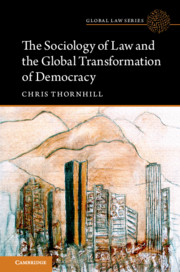The Sociology of Law and the Global Transformation of Democracy
This book provides a new legal-sociological account of contemporary democracy. This is based on a revision of standard positions in democratic theory, reflecting the impact of global legal norms on the institutions of national states. Chris Thornhill argues that the establishment of fully democratic, fully inclusive governance systems in national societies was generally impeded by inner-societal structural factors, and that inclusive patterns of democratic citizenship only evolved on the foundation of global legal norms that were consolidated after 1945. He claims that this process can be best understood through a transposition of key insights of classical legal sociology onto the form of global society. Extensive analysis of select case studies in different regions illustrate these claims. Thornhill offers a sociological theory of global law to explain contemporary processes of democratic integration and institutional formation and contemporary constructions of citizenship and political rights. This title is also available as Open Access.
Chris Thornhill is Professor in Law at the University of Manchester. He is the author of several books on the sociology of law, especially on the sociology of constitutions. His books and other writings have been translated into many languages. He is a member of the Academia Europaea.

